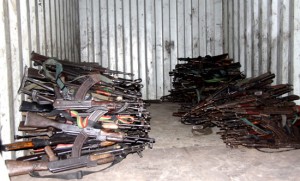South Sudanese Authorities Confiscate United Nations Weapons
 The government of South Sudan on Friday intercepted eleven United Nations (UN) trucks containing weapons reportedly on their way to Bentiu from Rumbek; the capital of Lake State.
The government of South Sudan on Friday intercepted eleven United Nations (UN) trucks containing weapons reportedly on their way to Bentiu from Rumbek; the capital of Lake State.
According to the VOA, the weapons – which had been mis-labelled as accoutrements and other accessories – belonged to the Ghanaian battalion of the United Nations peace keeping mission – who have been transferred to Bentiu, Unity State.
Officials have disclosed that the weapons were confiscated because their transportation on road violates an agreement between the South Sudanese government and the United Nations to make all the movements of arms by air.
The United Nations Mission in South Sudan (UNMISS) has described the incident as ‘regrettable’ and revealed plans of opening an investigation into the episode in collaboration with South Sudanese authorities, according to the spokesman for the South Sudanese army, Brigadier General Malaak Ayuen Agook.
In a statement released on Friday, the UNMISS office admitted the error noting that “It is the policy of the United Nations Mission in South Sudan (UNMISS) that during the crisis in South Sudan all arms and ammunition for peacekeeping contingents are flown into respective areas of deployment and not taken by road.”
The widely reported incident has further deepened the division between the government of South Sudan and the UN – whom several officials have accused of aiding the rebels.
In January, President Salva Kiir and other top ranking officials accused UN representatives of undermining the government’s power.
Many observers say these brewing disputes could potentially compromise the collaboration between the government of South Sudan and the UN – who currently run the largest peace keeping mission in the young warring nation.
Reports indicate that the African Union is presently making final preparations to deploy peace keeping forces to South Sudan.
The chairperson of the African Union Commission, Nkosazana Dlamini Zuma, on Friday revealed that the AU is set to deploy a five-member team to investigate reports of mass atrocities against civilians and other human rights abuses by the warring parties in South Sudan.
The agenda for the team, which is to be led by ex-Nigerian leader Olusegun Obasanjo, will be to “investigate human rights violations and other abuses committed during the armed conflict in South Sudan and make recommendations on the best way and means to ensure accountability, reconciliation and healing among all South Sudanese communities,” she said.
Calm returns to Juba
Residents of Juba have resumed their operations as usual after a shoot-out in a renowned barrack in the city mid-week left many groping in fear.
Reports indicate that the death toll has been put at 35, but officials say it is expected to increase.
According to Malaak Ayuen, the Director of Information of the South Sudanese Army, “Some people were killed in their offices, and houses came down on them so we started removing the stones and rubble. More bodies were discovered yesterday.”
Officials have dismissed the shoot-out as an isolated incident and it is unclear if the peeved soldiers behind the outburst are among the casualties or are in custody.
Currently, the prospects of peace in the world’s youngest nation is bleak.
The UN estimates that up to 870,000 people have been displaced due to violence and thousands killed.
Aid agencies have reported that many of the internally displaced civilians – a majority of whom are women and children – are at a great risk of experiencing food shortages and an outbreak of diseases as the rainy season approaches in the next few months.
The World Food Programme, on Friday, disclosed that it will deliver supplies to civilians in refugee camps in Maban County, Upper Nile State, through a combination of airlifts and airdrops.
The agency noted that replenishing supplies have been impossible as the usual routes were rendered unsafe by the conflict
Andrian Edwards, a representative of the United Nations High Commission for Refugees, told the press in Geneva on Friday that “Unless food is delivered immediately, the health and nutrition status of refugees will become severely compromised. We are in the dry season, the traditional hunger gap, when refugees are unable to grow food to supplement the World Food Programme (WFP) rations.”
The Inter-governmental Agency for Development (IGAD) has reported that the peace talks between representatives of President Salva Kiir and his ex-deputy Riek Machar will resume in about two weeks.
Although the prospects of the talks in Addis Ababa resulting in a truce between the rivals is generally low at the moment, many pundits have expressed optimism that the break will allow the parties analyse their positions and identify where they would be both willing to compromise for the sake of progress.
Photo by Gurtong: Arms collected from Sudan People’s Liberation Army soldiers in 2011 as part of the South Sudanese government’s disarmament strategy after the nation’s long war with the Sudan.